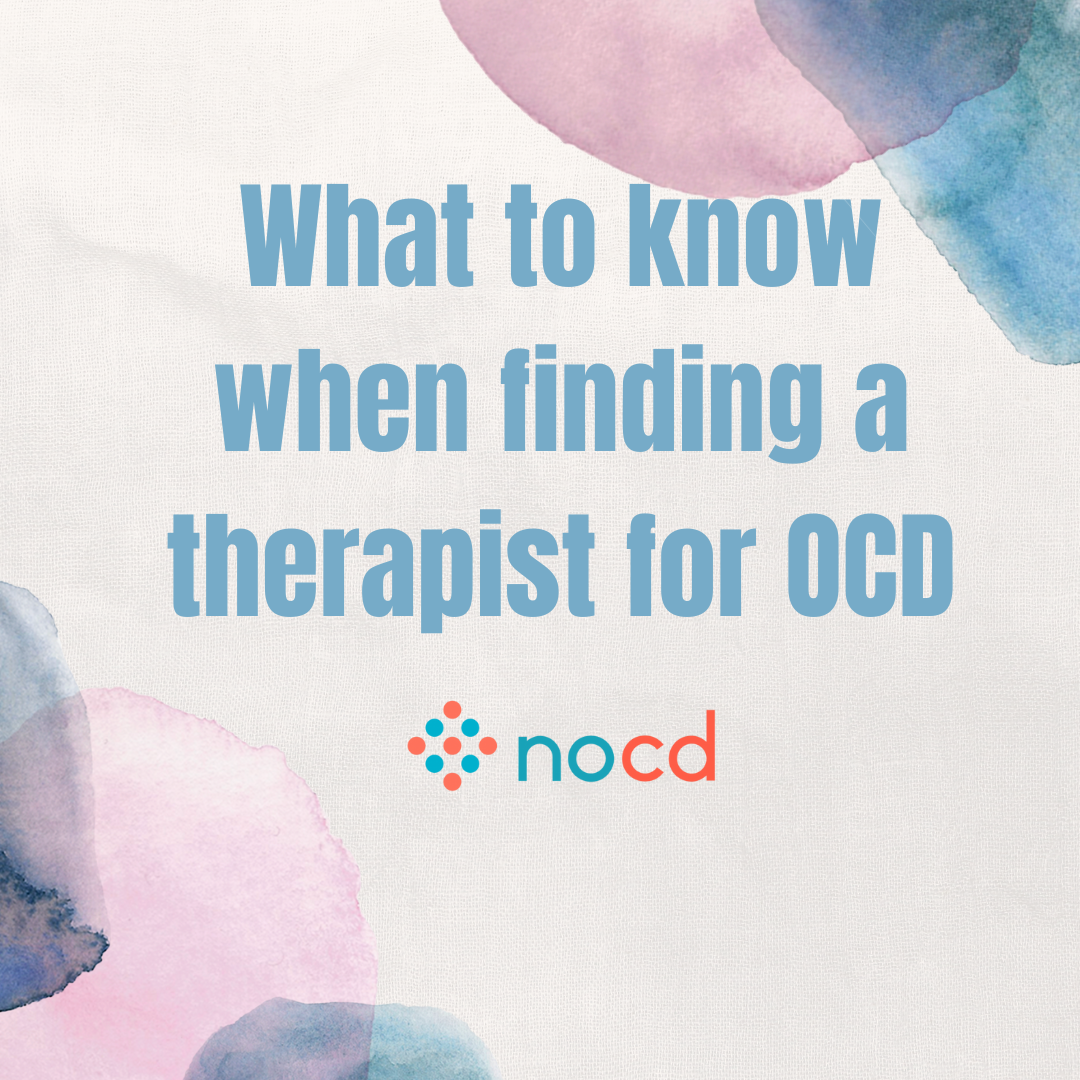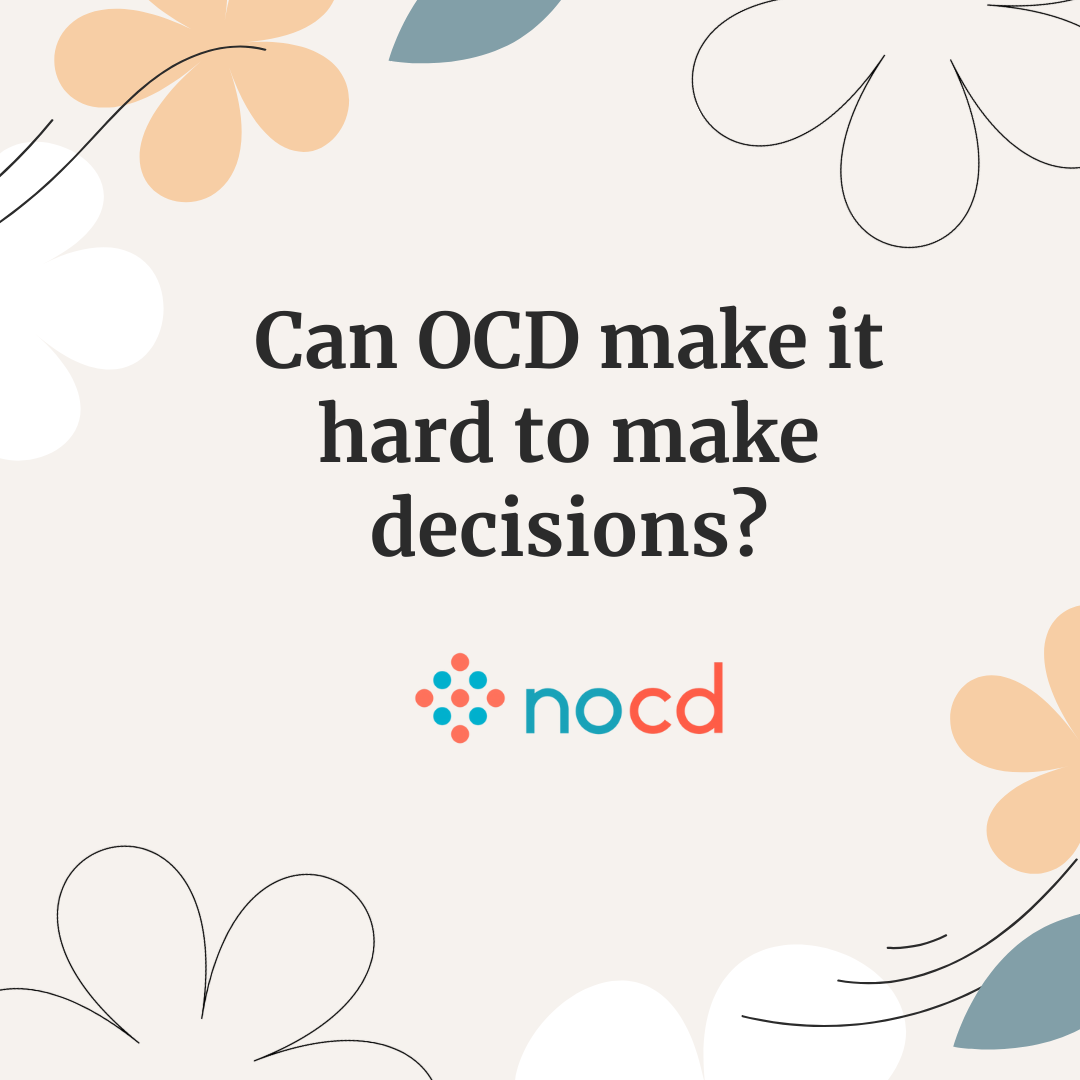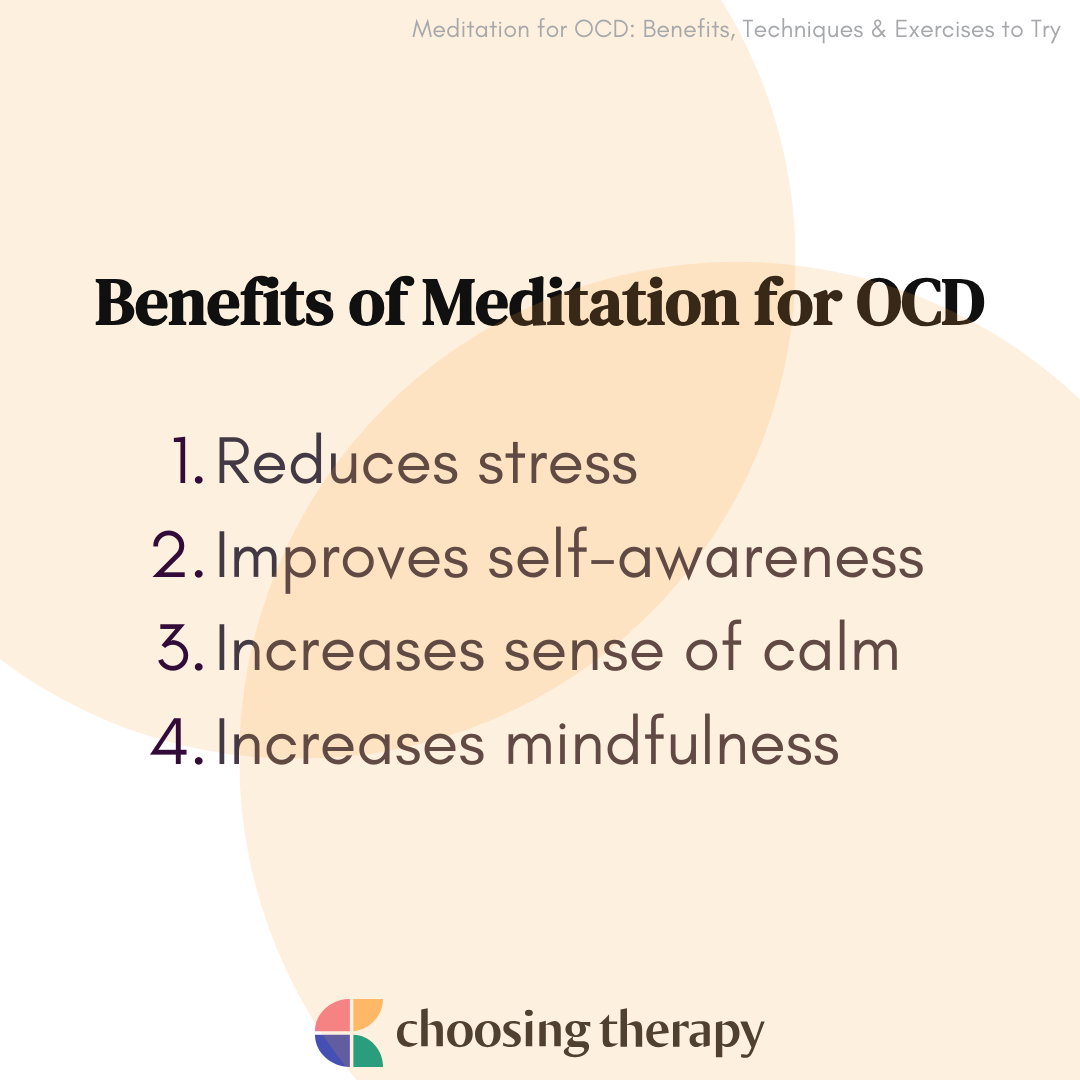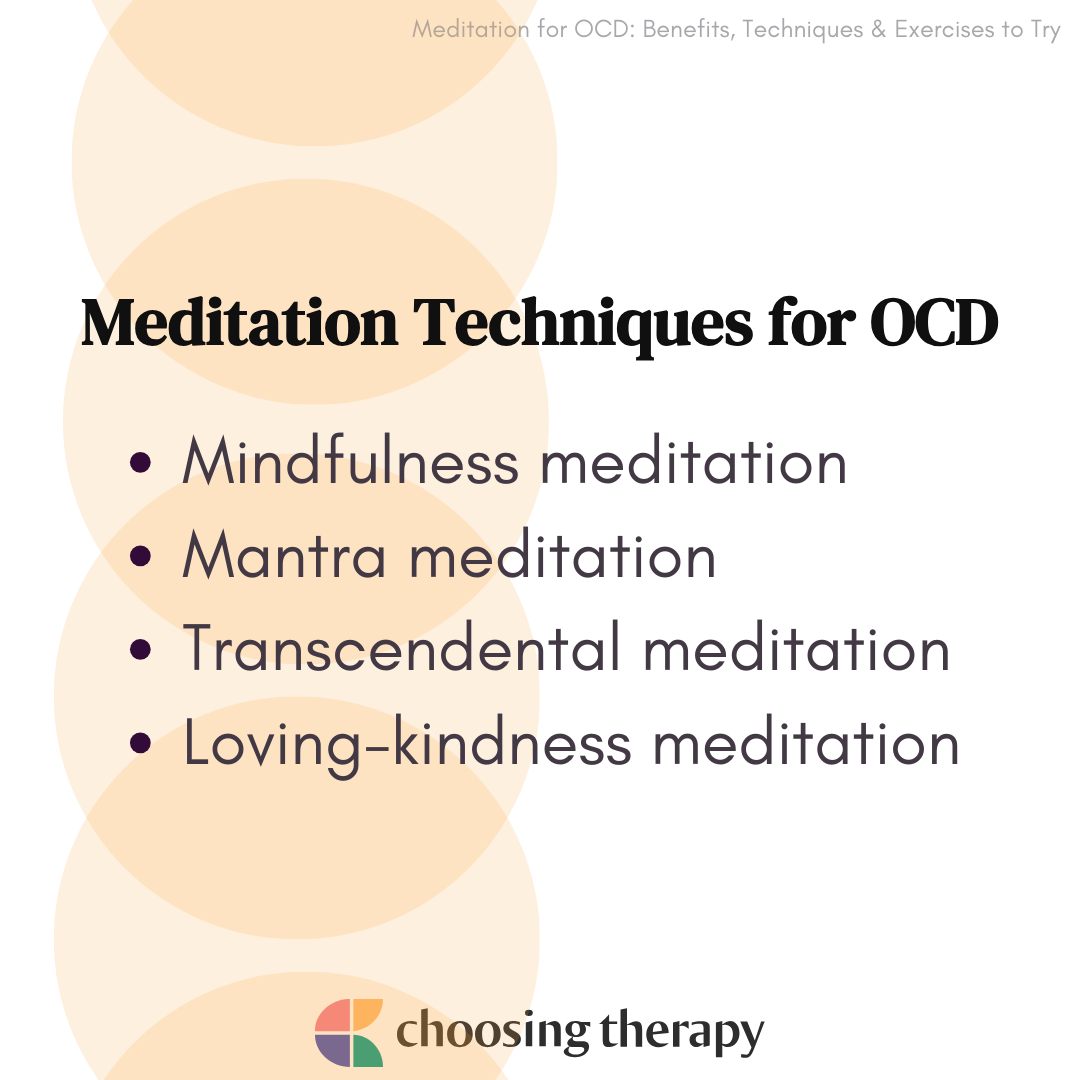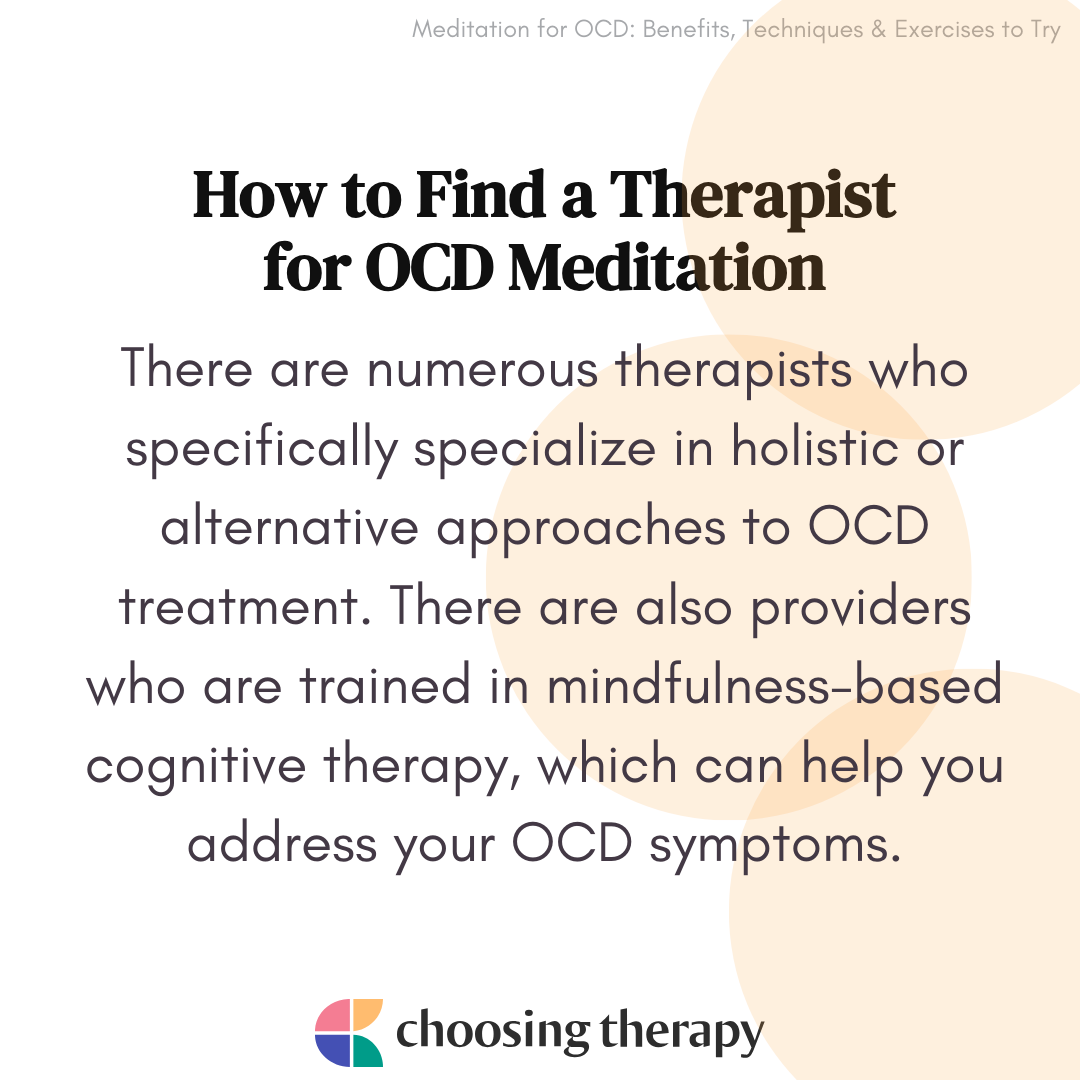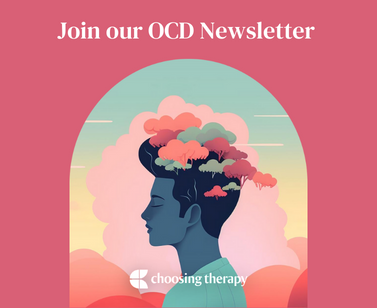Meditation may help lessen certain symptoms of OCD. Meditation and mindfulness can ease some OCD symptoms by offering a sense of calm and well-being, easing fearful narratives, and shifting attention back to the present moment.1 Studies show that meditation can heighten the effects of other forms of OCD treatment for some people.1
What is the best therapy for OCD? Exposure And Response Prevention Therapy (ERP) – Do live video sessions with a therapist specialized in ERP, the gold standard treatment for OCD. Treatment from NOCD is covered by many insurance plans. Start With A Free 15 Minute Call
Does Meditation Help With OCD?
For those who deal with OCD, meditation may be used to induce a sense of calm, manage OCD obsessions or urges, and limit the distress that accompanies negative feelings.1 Furthermore, meditation can also help a person deal with unwanted anxiety, anger, and stress, as well as improve emotional regulation and overall mood.
Here are five potential benefits of meditation for OCD:
1. Reduces Stress
Symptoms of OCD can be very stressful for those diagnosed with the condition. Meditation is known to help with reducing stress, as it encourages someone to focus all of their thoughts and energy onto the present moment, rather than on other factors. In turn, they are able to experience an increased sense of relaxation.
2. Improves Self-Awareness
Self-awareness refers to one’s ability to tap into their own thoughts, feelings, and world views. By increasing one’s self-awareness through meditation, a person may be able to better recognize when their OCD intrusive thoughts or urges are becoming overwhelming. They can then use coping skills to help themselves in these moments.
3. Increases a Sense of Calm
A person may experience a deepened state of relaxation and calmness while meditating.3 This may be because purposefully focusing one’s attention can decrease any jumbled thoughts that may be crowding their mind. Additionally, meditation may result in enhanced physical and emotional well-being, in turn producing internal peace and balance in the midst of feeling tense, overwhelmed, and distressed.3
4. Increases Mindfulness
Mindfulness for OCD encourages a person to approach their current thoughts without judgment. It teaches a person to accept a moment as it is, rather than attempt to neutralize it or get rid of internal conflict, which can be especially difficult for those diagnosed with OCD.4 Mindfulness invites a person to remain aware of their triggers, accept the discomfort they experience, and resist changing anxieties by engaging in compulsions.4
5. Increases Acceptance
Acceptance is key in mindfulness and meditation practices, and a skill that strengthens with regular practice. Someone regularly practicing acceptance develops the ability to step back and openly and non-judgmentally observe and embrace their experiences—even the tough ones—as they unfold in the moment. As it relates to OCD, this increased acceptance allows sufferers to acknowledge a thought, feeling, or sensation for what it is without intending to shut it down.
Fostering acceptance is how obsessions can diminish and gradually fade away, thus inhibiting the urge to engage in compulsive behaviors.5
Treatment For OCD NOCD: Online OCD Treatment Covered By Insurance – Regain your life from OCD. Do live video sessions with a licensed therapist specialized in treating OCD. Treatment from NOCD is covered by most major insurance plans. Learn how you can use your insurance benefits. Visit NOCD Talkiatry: Is OCD Medication Right For You? Speak with A Doctor – Talkiatry can match you with a psychiatrist who takes your insurance and is accepting new patients. They’re in-network with major insurers and offer medication management with supportive therapy. Free Assessment
OCD Meditation Techniques
There are many types of meditation techniques that can be utilized to support with managing OCD symptoms. There is no right or wrong way to start, so experiment and see which ones work best for you.
Types of meditation that are helpful for managing OCD symptoms include:
Mindfulness Meditation
Mindfulness meditation is practiced by dedicating a certain amount of time to intentionally focus on what you are experiencing in a given moment. Acknowledging how your thoughts and emotions feel within you creates a mind-body connection. It may also affect the brain by shrinking the amygdala, which is associated with fear and responses to stress.7
Mindfulness can be practiced throughout the day—it simply means being fully present in each moment, noticing what is happening within and around you, and remaining connected with yourself and your environment.
Here are some ways to practice mindfulness meditation for OCD:
- Decide if you would like to set a timer for this practice, or play light music or sounds in the background.
- Find a comfortable and quiet area to sit or lay down.
- If it is safe to do so and you are comfortable, close your eyes. You can also keep your eyes open and focus on an area in front of you.
- Begin to notice and focus on your breath; notice how the air feels when it flows in through your nose and out through your mouth.
- Notice the rising and falling of your belly as you breathe in and out, and how your body feels.
- If any thoughts or urges pop up, do not place judgment on them; allow them to sit and pass.
- Notice any sensations in your body, noticing tension release as you breathe out.
- Continue to keep your mind focused on your breath and the sensations in your body without judgment.
- As you near the end of your practice, take three last deep breaths; in through your nose and out through your mouth.
- Gently roll your neck side-to-side to awaken your body.
- When you are ready, open your eyes.
Mantra Meditation
Mantra meditation can be done by finding a comfortable and quiet space to close your eyes or focus on a certain object. Mantras may be a sound, a single word, or a phrase repeated silently or out loud.
Mantra meditation brings your mind back to the present and cultivates focused control.8 This can be helpful for someone who is experiencing hypervigilance or hyperarousal, because they can repeat to themselves an affirmation that eases and grounds their mind.
Here is how to practice mantra meditation for OCD:
- Find a comfortable and quiet area to sit, stand, or lay down.
- If it is safe to do so and you are comfortable, close your eyes. You can also keep your eyes open and focus on an area in front of you.
- Begin to notice and focus on your breath; notice how the air feels when it flows in through your nose and out through your mouth.
- Notice the rising and falling of your belly as you breathe in and out, and how your body feels.
- If any thoughts pop up, allow them to flow and pass; do not judge or create meaning out of them. Accept them as they are and gently bring your focus back to your breath.
- Affirm to yourself, “I am present, I am strong, I am at peace,” or come up with your own mantras that work for you.
- Revert your focus back to your breath and continue repeating your mantras as you need throughout your meditation.
- As you take your final three deep breaths, pick a mantra you want to carry with you for the remainder of the day.
- Bring your attention back to your body and the room; when you are ready, gently open your eyes. Observe your surroundings and take a few gentle stretches.
- Carry your mantra with you (by writing it down or just mentally making note of it) and utilize this in combination with other positive coping skills when symptoms of OCD arise throughout the day.
Transcendental Meditation (TM)
Transcendental meditation is practiced to help a person avoid distracting thoughts and promote a state of relaxed awareness. This meditative practice involves sitting in a comfortable position with your eyes closed and silently repeating a mantra. This is similar to mantra meditation, but the mantra is meant to be meaningless and used simply to “channel a silent, stable, quiet realm.”1
This method of meditation does not require significant effort or concentration. Rather, people are encouraged to simply breathe normally and focus their attention on the mantra.9 During this state of mind, the individual works to stay perfectly still, void of mental boundaries or obscurities.9
Loving-Kindness Meditation
Loving-kindness meditation is another form of meditation that can be practiced in a variety of ways. One method includes shifting your focus from yourself and onto others. Or, you may choose to focus inwards instead, and emphasize loving-kindness towards yourself. Whether the focus is on others or internally, this meditation practice improves mindfulness and increases compassion towards yourself and others.
This type of meditation can help with symptoms related to OCD including stress management, emotional regulation, depression, and anxiety.
Below is a guided loving-kindness meditation for OCD:
This loving-kindness meditation is designed to extend loving-kindness to yourself.
- First, find a space where you feel comfortable and at ease with minimal distractions.
- When you are ready, find a comfortable sitting or lying position to begin and close your eyes or focus on a spot in front of you.
- Begin to take three deep breaths, focusing on the air coming in through your nose and out through your mouth.
- Bring your breath to a natural pace and shift your focus onto yourself.
- Bring to mind a few mantras you would like to affirm to yourself (like “May I be content, may I be at peace, may I be free from suffering, may I be present and grounded as I move through the day”).
- If your mind wanders at all, gently bring your mind back to the mantras and your breath.
- After about five minutes, take a deep inhale and release.
- Again, take a deep inhale, focusing on drawing in your intention and compassion for yourself and release.
- Gently roll your neck in a clockwise and counterclockwise rotation, if it is physically safe for you to do so.
- Continue with gentle stretches if your body needs it.
- When you are ready, open your eyes and continue to move through the remainder of your day with a disposition of loving-kindness.
How much do you know about OCD? Take This 11-Question OCD Quiz From NOCD. If you or a loved one are struggling with OCD, NOCD provides convenient, affordable, and effective OCD treatment covered by most major insurance plans.
Other Mindfulness for OCD Practices to Try
There are a variety of simple mindfulness exercises that can bring moment-to-moment awareness, helping people with OCD better manage their symptoms.
Here are six more mindfulness practices that could help someone with OCD:5
- Breathing meditation: Closing your eyes and taking a few breaths in through your nose and out through your mouth, make a “wind” sound as the air leaves your body. Then return to breathing normally, in and out through the nose, noticing where in your body you feel your breath the most.
- Body scan: In a comfortable position, close your eyes and, while slowly taking deep breaths, shift your attention to your feet and then gradually work your way up to your face, focusing on how each body part feels one at a time. From there, start moving back down, through each body part, until you reach your feet again.
- Progressive muscle relaxation: Find a quiet place to sit or lay down comfortably, then close your eyes and focus on your breathing. Deliberately tense (without straining) and relax different muscles in the body. Upon finishing, Pay special attention to how releasing tension in each muscle results in a feeling of calmness.
- Walking meditations: This activity works well, particularly if you have difficulty sitting still during a typical meditation. It involves walking slowly while placing your attention on the feeling of the weight on the bottom of your feet and how your body moves and feels with each step you take.
- Imagery: For OCD, this exercise involves imagining the presence of an obsessive thought and letting it flow through your body without compulsively having to address it. Rather than trying to discard it, you invite it without judgment while focusing on your breathing.
- Yoga: Yoga intertwines mind, body, and spirit by combining deep breathing, physical stretches, and meditation. These components of yoga can help reduce stress and make OCD symptoms more manageable on a day-to-day basis, especially when combined with therapy. Consider finding a class in your area or using a yoga app.10
How to Get Started With Your OCD Meditation Practice
You can start practicing meditation exercises at home on your own at any time. Not only are there four guided meditations listed within this article, there are many other resources to consider. For example, there are plenty of meditation apps, meditation books, and meditation YouTube channels available for additional tips on how to get started.
How Effective Is Meditation for OCD?
Various studies have been performed to identify the impact meditation may have on OCD symptoms. One study found that people who utilized mindfulness skills felt less of an urge to carry out compulsions compared to those who used distraction strategies.4 Other research shows that mindfulness meditation had “a significant and large effect” on participants’ OCD symptoms, particularly on thought-action fusion (the belief that having a thought is the same thing as acting on the thought) and the ability to “let go” of undesired thoughts.4
Additional research suggests that those who with OCD who engage in meditation may have:4
- An increased willingness to allow unpleasant emotions to exist
- Improved ability to cope with these emotions
- Heightened sense of mental presence
- Better overall mood
Meditation Should Be a Supplement to OCD Treatment
Therapy is typically considered to be the frontline treatment option for OCD, specifically exposure and response prevention (ERP). However, when someone does not achieve results through therapy alone, they may choose to include medication as a part of their treatment plan. Meditation can also be added as an additional method, as it can be utilized as a positive coping skill. While there is no cure for OCD, symptom management is possible through effective treatment.
Therapy
Exposure and response prevention is generally considered to be the most effective therapy approach for OCD, but other therapeutic options may be offered depending on a person’s individual needs.
Therapy options for OCD include:
- Exposure and response prevention (ERP): ERP is a form of CBT that focuses on an individual facing their fears while resisting compulsive urges.
- Cognitive behavioral therapy (CBT): CBT for OCD works by intercepting the automatic process between one’s obsessive thoughts and corresponding compulsive behaviors. It teaches and trains an individual to refrain from engaging in a ritual when anxiety arises.
- Mindfulness-based CBT (MBCT): MBCT helps individuals develop a new relationship with intrusive thoughts and emotions by combining aspects of cognitive therapies and principles of mindfulness.
- Repetitive transcranial magnetic stimulation (TMS): TMS is used to treat OCD and depression through non-invasive deep brain stimulation.
- Electroconvulsive therapy (ECT): This procedure is performed while an individual is under general anesthesia and utilizes small electric currents that are passed through the brain.11 ECT elicits changes in brain chemistry which may possibly reverse certain symptoms of some mental health conditions.11
Medication
The most commonly-prescribed medications for OCD are selective serotonin reuptake inhibitors (SSRIs), which are considered safe and effective. They have a low risk of producing serious side effects in users, and usually take between 8 and 12 weeks to begin working.6
How to Find a Therapist for OCD Meditation
There are numerous therapists who specialize in holistic approaches to OCD treatment. There are also providers who are trained in mindfulness-based cognitive therapy, which can help you address your OCD symptoms. To start your search for the right therapist, you can use an online therapist directory with which you can search by specialty, state, and insurance compliance.
In My Experience
To help our readers take the next step in their mental health journey, Choosing Therapy has partnered with leaders in mental health and wellness. Choosing Therapy is compensated for marketing by the companies included below. OCD Therapy NOCD: Effective, Affordable, & Convenient OCD Therapy Do live, face-to-face video sessions with a therapist who specializes in treating OCD and get 24/7 support between sessions. NOCD is covered by many insurance plans and is available nationwide. Visit NOCD Treatment From An Online Psychiatrist Talkiatry OCD is treatable. Talkiatry specializes in OCD and provides personalized care with medication and additional support. Get started with a short assessment. OCD Newsletter A free newsletter from Choosing Therapy for those impacted by OCD. Get helpful tips and the latest information. Sign-UpAdditional Resources
What to know when finding a therapist for OCD With so much information out there regarding providers and treatment options for obsessive compulsive disorder, it can be hard to know exactly where to start—especially when you have to consider everything from the type of provider to the different treatment methods, as well as how you’ll fit it into your busy schedule. Can OCD make it hard to make decisions? From choosing what to wear in the morning to picking what to eat for dinner, decision-making is a part of everyone’s daily routine. But for millions of people with Obsessive-Compulsive Disorder (OCD), making any choice can feel like a daunting, sometimes impossible task.